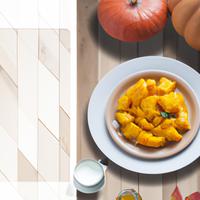
1 serving (205 grams) contains 82 calories, 1.8 grams of protein, 0.2 grams of fat, and 21.5 grams of carbohydrates.

Log this food in SnapCalorie

Nutrition Information
Calories |
94.7 | ||
|---|---|---|---|
% Daily Value* |
|||
| Total Fat | 0.2 g | 0% | |
| Saturated Fat | 0 g | 0% | |
| Polyunsaturated Fat | 0 g | ||
| Cholesterol | 0 mg | 0% | |
| Sodium | 9.2 mg | 0% | |
| Total Carbohydrates | 24.8 g | 9% | |
| Dietary Fiber | 7.6 g | 27% | |
| Sugars | 4.6 g | ||
| protein | 2.1 g | 4% | |
| Vitamin D | 0 mcg | 0% | |
| Calcium | 97.0 mg | 7% | |
| Iron | 1.4 mg | 7% | |
| Potassium | 672.1 mg | 14% | |
* Percent Daily Values are based on a 2,000 calorie diet. Your daily values may be higher or lower depending on your calorie needs.
Food Attributes
Source of Calories
About Cooked butternut squash
Cooked butternut squash is a versatile and nutrient-rich food originating from the Americas, where it has been cultivated for centuries. This naturally sweet and vibrant orange vegetable is high in vitamins A and C, both of which support immune health and skin integrity. It also contains fiber, which aids digestion, and potassium, contributing to heart health and balanced blood pressure. Low in fat and calories, butternut squash is often used in soups, roasted dishes, and purees within global cuisines, including American and Mediterranean. Rich in antioxidants like beta-carotene, it promotes eye health and may help reduce inflammation. While packed with nutrition, preparation methods like cooking with excessive butter, cream, or sugar can add unhealthy fats and calories. Opting for basic roasting or steaming helps retain its health benefits without overloading on extras.



